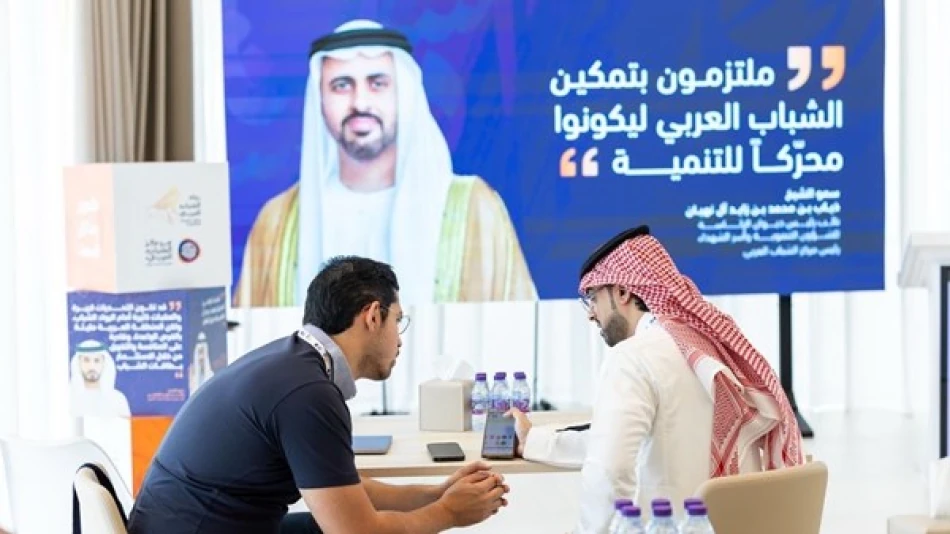
Arab Youth Leaders Initiative Launches 4th Edition with H.H. Sheikh Dheyab bin Mohamed bin Zayed's Patronage
UAE Launches Ambitious Arab Youth Leadership Initiative to Transform Regional Innovation Landscape
The UAE has unveiled the fourth edition of its flagship "Arab Youth Pioneers Initiative," bringing together 40 exceptional young leaders from 13 Arab nations in a strategic move to reshape the region's innovation ecosystem. Under the patronage of Sheikh Dhiyab bin Mohammed bin Zayed Al Nahyan, this comprehensive program represents the Emirates' most ambitious effort yet to cultivate cross-border entrepreneurial talent and establish Abu Dhabi as the Middle East's premier innovation hub.
A Strategic Investment in Regional Talent
The initiative, organized by the Arab Youth Center in strategic partnership with the Abu Dhabi Business Youth Council, targets ten specialized sectors that represent the future of the Arab economy: industries and innovation, community service, scientific research, space and technology, medicine and health sciences, sustainability and environment, entrepreneurship, education, engineering, and digital media and citizenship.
Participants hail from the UAE, Saudi Arabia, Bahrain, Egypt, Sudan, Mauritania, Palestine, Oman, Kuwait, Jordan, Morocco, Lebanon, and Syria—a geographic spread that positions the program as a genuine pan-Arab initiative rather than a purely Gulf-focused effort.
Beyond Traditional Incubation Models
This year's program distinguishes itself from conventional startup accelerators through its comprehensive approach. Participants receive field visits with decision-makers, direct access to experts and investors, and business incubation opportunities. The "Pioneers Lighthouse Package" from Abu Dhabi Business Youth Council provides practical support, while over 15 local and regional partners offer consultations and operational facilitations.
Notably, the program includes advanced training workshops and a research study conducted with Trends Research & Advisory Center to measure impact—suggesting a data-driven approach to youth development that mirrors successful models in Singapore and Switzerland.
Market Implications for Regional Innovation
From an economic perspective, this initiative signals the UAE's recognition that sustainable growth requires regional talent development beyond oil revenues. By investing in human capital across multiple Arab nations, the Emirates is effectively creating a pipeline of innovation that could strengthen its position as the region's financial and technological center.
Notable Participants and Their Market Potential
The caliber of participants reveals emerging trends in Arab innovation. In space technology, participants include Lama Al-Areiman from Kuwait, an analog space pioneer, and Marwan Mohiy Yahya from Egypt, founder of a rocket company positioning the region on the global space map. These selections align with the UAE's own space ambitions following its successful Mars mission.
In the sustainability sector, standout participants include Maryam Hassan Al-Ghafri from the UAE, who developed youth programs for biodiversity conservation, and Maitha Salik Al-Matrooshi, founder of Bird Collaborative, which has removed millions of single-use plastic products from oceans. This focus on environmental innovation reflects growing investor interest in ESG-compliant ventures across the Gulf.
The entrepreneurship track features particularly promising ventures: Fatima Ahmed Al-Mousawi created the UAE's first luxury tea brand inspired by national heritage, while Ali Amr Ashara from Egypt developed AI technology for sign language translation—innovations that could scale regionally and globally.
Competitive Positioning Against Global Innovation Hubs
This initiative positions the UAE in direct competition with established innovation ecosystems like Israel's tech sector and emerging hubs in Saudi Arabia's NEOM project. Unlike purely domestic programs, the cross-border approach creates network effects that could accelerate knowledge transfer and market access across Arab nations.
The program's emphasis on practical business skills—including a specialized workshop on "Presentation Skills and Entrepreneurial Storytelling"—addresses a critical gap in regional startup ecosystems where technical innovation often exceeds business development capabilities.
Long-term Strategic Vision
Dr. Sultan Al-Neyadi, UAE Minister of State for Youth Affairs and Deputy Chairman of the Arab Youth Center, framed the initiative as an investment in "building a thriving knowledge economy" with impact extending "beyond national borders to reach the entire world." This language suggests ambitions that extend far beyond regional development to global competitiveness.
The program's structure—combining government backing, private sector partnerships, and academic institutions like the Anwar Gargash Diplomatic Academy—creates an institutional framework that could be replicated across the region, potentially establishing the UAE as the architect of Arab world innovation policy.
Market Outlook and Investment Implications
For investors, this initiative signals several trends worth monitoring. First, the UAE government's continued commitment to diversification through human capital development suggests sustained support for innovation sectors. Second, the cross-border approach may create new market opportunities as participants build networks spanning multiple Arab economies.
The program's focus on emerging technologies—AI, space technology, sustainable solutions, and digital health—aligns with global investment trends while addressing regional market needs. Participants in these sectors may represent early-stage opportunities in markets with significant growth potential but limited competition.
Most significantly, the initiative demonstrates how smaller nations can leverage strategic partnerships and focused investment to compete with larger economies in the global innovation landscape—a model that other emerging markets will likely study and adapt.
Most Viewed News

 Layla Al Mansoori
Layla Al Mansoori






